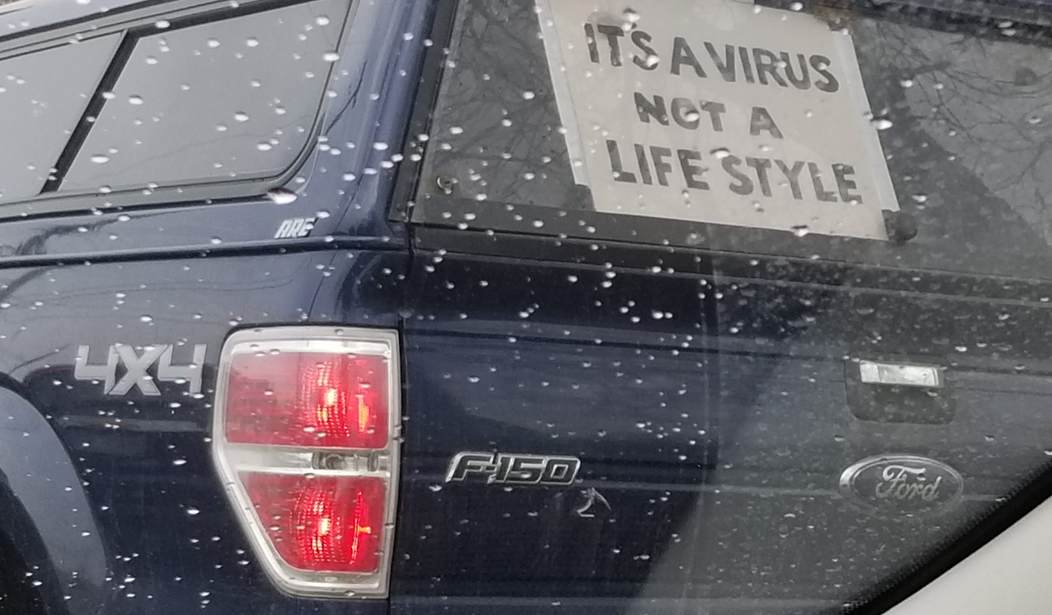Last week, Michiganders protesting Gov. Gretchen Whitmer (D-Mich.)’s tyrannical coronavirus quarantine orders shut down the streets of Lansing while safely quarantined in their cars. That protest was organized on Facebook. On Monday, CNN reported that Facebook has removed protest pages in California, New Jersey, and Nebraska, in coordination with state governments. In a statement to PJ Media, the social media company confirmed that it would remove protests that have been prohibited by local governments.
“Anti-quarantine protests being organized through Facebook in California, New Jersey, and Nebraska, are being removed from the platform on the instruction of governments in those three states because it violates stay-at-home orders, Facebook spokesperson [Andy Stone] tells [CNN reporter Donie O’Sullivan],” CNN’s Oliver Darcy tweeted.
Anti-quarantine protests being organized through Facebook in California, New Jersey, and Nebraska, are being removed from the platform on the instruction of governments in those three states because it violates stay-at-home orders, Facebook spokesperson @andymstone tells @donie.
— Oliver Darcy (@oliverdarcy) April 20, 2020
O’Sullivan tweeted, “Facebook says it has removed promotion of anti-quarantine events in California, New Jersey, and Nebraska after consultation with state governments. Says it is working to get answers from New York, Wisconsin, Ohio, and Pennsylvania as to whether anti-quarantine protests breaks those states’ social distancing measures.” A Pennsylvania protest had been scheduled for Monday.
Facebook says it has removed promotion of anti-quarantine events in California, New Jersey, and Nebraska after consultation with state governments
— Donie O'Sullivan (@donie) April 20, 2020
Facebook confirmed these reports.
“Unless government prohibits the event during this time, we allow it to be organized on Facebook,” a spokesperson for the social media company told PJ Media. “For this same reason, events that defy government’s guidance on social distancing aren’t allowed on Facebook.”
The social media company told PJ Media that it will uphold local government restrictions on protests. In many cases, government authorities have clarified that they are allowing protests so long as protesters continue to abide by social distancing guidelines such as standing 6-feet apart. The thousands of protesters in Tel Aviv on Sunday demonstrated this kind of socially distant protest, and Facebook will allow pages advocating this kind of protest when the local government approves of it.
However, the Facebook spokesperson told PJ Media the platform will remove content advocating for in-person protests that defy government health guidance as well as claims designed to discourage the appropriate precautions. It seems this may open the door for potential abuse by local governments.
When evaluating a protest page, the social media company first checks to see if the protest page calls for social distancing where that is required. Where local government has required social distancing practices, Facebook will require that a protest page includes a call to maintaining social distancing during the protest. State officials can contact the social media company to explain their social distancing requirements.
Facebook told PJ Media it has taken steps to fight the global pandemic, including limiting misinformation and harmful content about the coronavirus, connecting people to accurate resources like the World Health Organization (despite its rush to echo China’s false claims on the virus), prohibiting ads that might create panic or imply a perfect cure, banning ads selling medical face masks, and giving the WHO free ads.
Facebook’s efforts are laudable, and the social media company faces a truly difficult situation since users rely upon it for news, contact with friends and family, and other forms of social organization.
However, it is disconcerting that Facebook would work with local governments to remove pages organizing protests against them. Many governments have taken extreme and tyrannical approaches to restrict behavior during the coronavirus crisis, including banning completely safe activities like drive-in church services. Americans should be free to organize protests against such abuses.
At the same time, Facebook is in a lose-lose situation. If the social media company allows all protests, it might help people organize in-person protests that could spread the virus, in addition to drive-in protests like the one in Lansing, where almost everyone involved remained isolated in vehicles and therefore did not spread the virus. If Facebook bans all protests, however, it would cut off one of the key platforms for potential organizing and inspire a justified backlash.
Given this difficult position, Facebook’s policy on protest events makes sense, although it may allow for too much potential abuse from state and local governments. If churches plan a drive-in protest against bans on drive-in church services in Kentucky, for example, Facebook may decide to ban that event because Gov. Andy Beshear (D-Ky.) has prohibited drive-in church services and protesters would be using the same basic strategy in those services to protest the ban.
At that point, however, the outrage should be directed against the governors whose orders Facebook is following, more than against the social media company itself. When governors like Whitmer abuse their authority, Americans should remember in November.
Tyler O’Neil is the author of Making Hate Pay: The Corruption of the Southern Poverty Law Center. Follow him on Twitter at @Tyler2ONeil.
Editor’s Note: Want to support PJ Media so we can keep telling the truth about China and the virus they unleashed on the world? Join PJ Media VIP and use the promo code WUHAN to get 25% off your VIP membership.









Join the conversation as a VIP Member